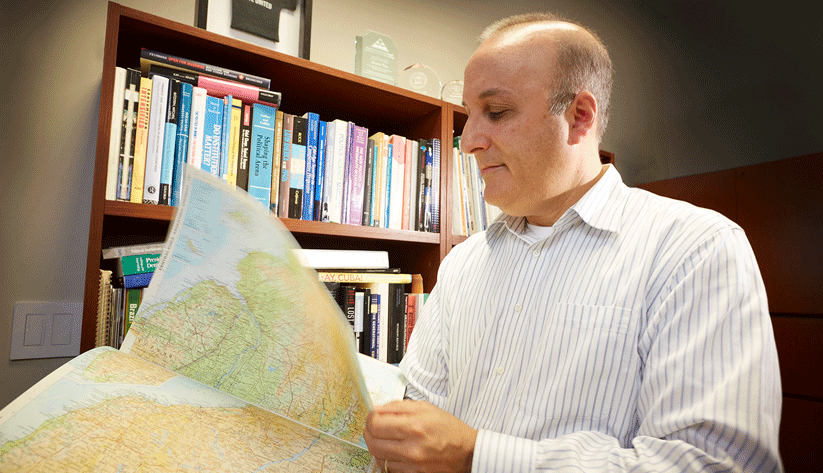
Stephen Kay occupies an office at the Atlanta Fed's Midtown headquarters, but his thoughts are typically on events occurring 3,000 miles away.
Kay, a member of the Bank's financial markets team, is the director of the Americas Center, an initiative among several departments at the Atlanta Fed that have responsibilities tied to Latin America.

The Americas Center's Stephen Kay. Photo by David Fine
The center is a cooperative effort among Atlanta Fed staff and external partners that conducts research and outreach involving the Americas. It sponsors policy conferences, participates in exchange programs, and serves as an information resource about Latin American economic issues.
The work of the Americas Center involves areas in the Bank as diverse as the Research Department, the Supervision, Regulation, and Credit Division, Operations and Administrative Services, and the Retail Payments Office.
Pooling intellectual capital
"A few years ago, we realized that many people at the Bank, through various teams, were working on Latin American-related issues," said Kay, a fluent Spanish and Portuguese speaker who has lived in Argentina, Chile, and Brazil. "Sometimes we talked to each other and sometimes we didn't. We realized we'd work better if we were coordinating our activities and sharing our resources."
In the 13 years since the center was formed, those departments at the Bank have worked together on numerous projects to provide leadership on supervisory, financial, and economic matters related to the Americas and Spain. The center cosponsors an annual international economics workshop with Atlanta's Emory University and an annual workshop on development economics with Mercer University, Georgia Institute of Technology, and the University of Georgia.
"We try to identify issues that need attention and figure out who we can bring together to address them," said Kay, whose own research focuses on political economy and public policy in Latin America.
A vitally important region
The economies of Latin American countries have become increasingly connected to the U.S. economy. Given its proximity to the Southeast, the region is of special interest to economists at the Atlanta Fed, whose district includes Alabama, Georgia, and Florida and parts of Tennessee, Louisiana, and Mississippi.
"There's a lot of interest in what's going on in Latin America today," noted Kay, who pointed out that the United States exports more to Latin America than to Canada, China, or Europe. "Investment and trade are growing, and people are looking more and more to Latin America for opportunities."
Florida accounts for 24 percent of total U.S. merchandise trade with Latin America and the Caribbean, according to foreign trade data from the U.S. Census Bureau. Of the state's total worldwide exports in 2016, 74 percent, or $50.1 billion in goods, went to Latin America and the Caribbean, according to U.S. Department of Commerce data.
Miami and South Florida, in particular, are important gateways to Latin America. Miami, site of one of the Atlanta Fed's five branch offices, is a major financial center for banks that service Latin American markets. The Cash Department of the Atlanta Fed's Miami Branch supplies currency to South Florida, but the majority of its global cash transactions serve customers in Central and South America and the Caribbean Basin.
Business aside, a cultural kinship exists between Miami and the Americas. Nearly 70 percent of the city's population is Hispanic, and Spanish is widely spoken there.
"Miami is really a cultural hub for Latin America, and that places the Atlanta Fed in a good spot to help bring people together who study the economies of Latin America and its financial systems," said Michael Chriszt, vice president of public affairs at the Atlanta Fed. Chriszt helped develop the Americas Center when he worked in the Bank's Research Department.
The center's work is broad in scope
The work of the Americas Center cuts a wide swath. The staff tracks Latin American economies, connects payment systems of the Fed with central banks in the Americas, and invites distinguished foreign policymakers and economists to visit the United States.
For example, in 2017 Mexico's ambassador to the United States, Gerónimo Gutiérrez Fernandez, spoke at an Atlanta Fed event that was cohosted by the Americas Center and the World Affairs Council of Atlanta. The Americas Center also brought in two distinguished visiting scholars, economists Carmelo Mesa-Lago and Omar Everleny Pérez Villanueva, to discuss their new research on Cuba's economy.
Another notable project was a 2011 visit to Chile by then–Atlanta Fed President Dennis Lockhart to meet with central bank presidents from Latin American countries. Members of the Bank's international supervisory team, who regularly meet with their Latin American counterparts, joined him on the trip.
The Americas Center web page provides original Atlanta Fed research as well as links to external research, articles, and presentations on economic and financial topics. Some of the site's content is also available in Spanish and Portuguese.
This year, Kay is planning a conference built around the topic of "de-risking," a trend that has seen American and European banks sever ties with financial institutions in developing countries because of concerns about money laundering and weak supervision. The resulting decline in correspondent relationships with foreign banks has hit the Caribbean especially hard. The Americas Center is looking to convene policymakers, central bankers, technology companies, and other experts from the financial arena to discuss the implications and potential solutions.




